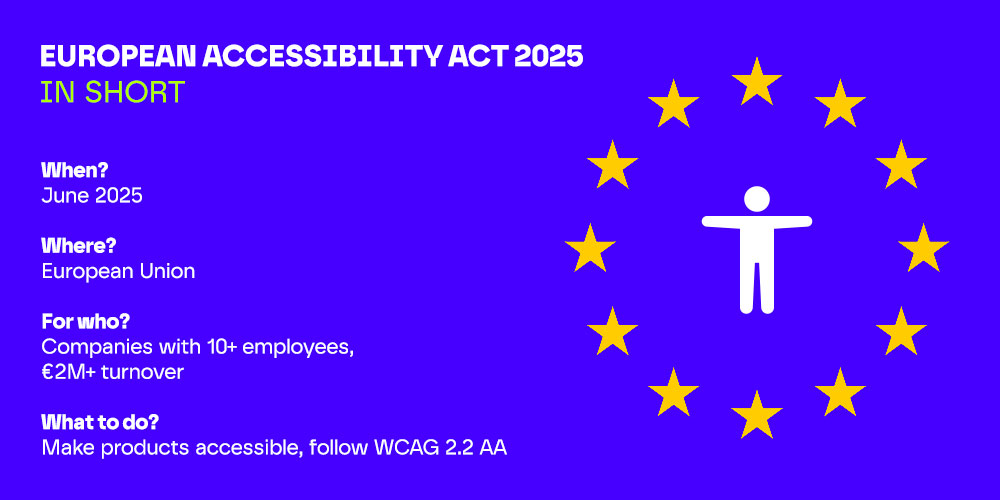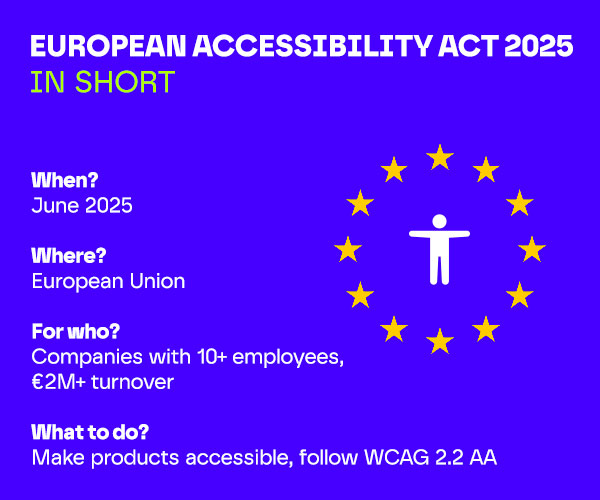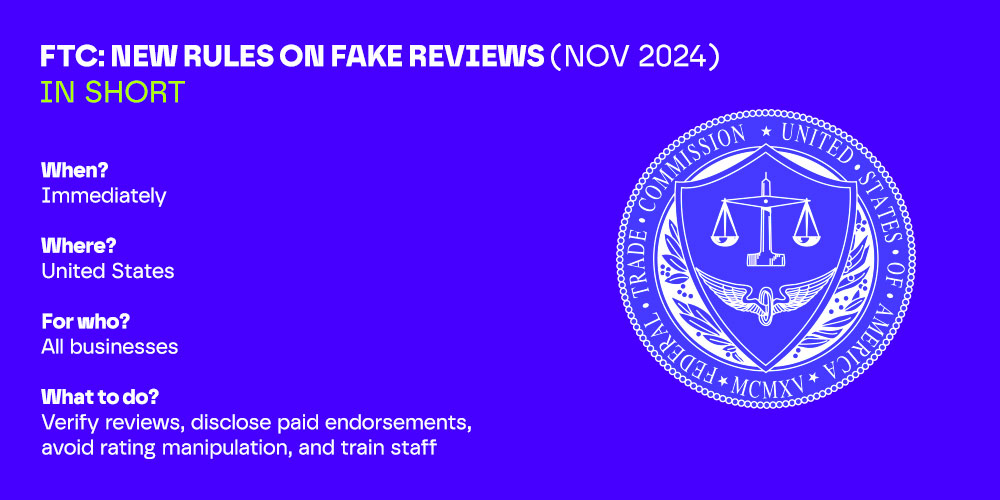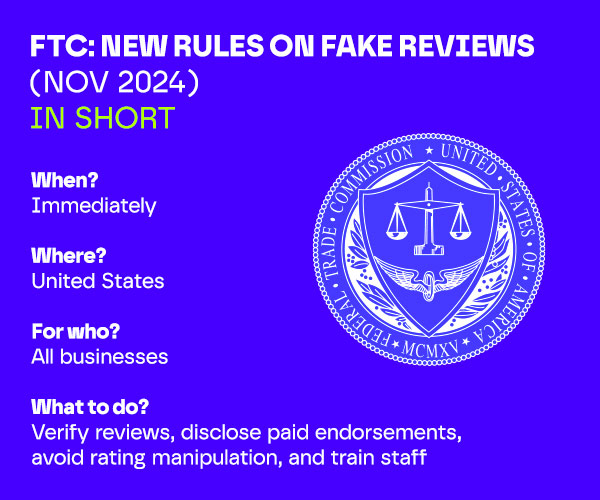The digital business operates in an increasingly complex world where we must consider not only the evolving technology but also its darker aspects and the barriers it creates. The ongoing regulations introduced by governments address these challenges. As your trusted digital innovation provider, we strive to stay informed and anticipate upcoming regulatory changes that your websites, web applications, and mobile applications will need to comply with.
In our Compliance Alert series, we highlight regulations that business owners—particularly those operating in Europe, the United States, and Canada—will need to consider when developing their digital tools. This time, we will briefly discuss the European Accessibility Act and the FTC's new rules on fake reviews.
THE EUROPEAN ACCESSIBILITY ACT 2025
What is EAA?
The EAA (European Accessibility Act) is a new EU regulation aimed at guaranteeing equal access for individuals with disabilities to a wide range of digital and physical products and services. While previous legislation, such as the EU Directive on the accessibility of public sector bodies' websites and mobile applications (PSBAR), focused mainly on the public sector, the EAA extends these responsibilities to private companies and covers a broader array of products and services.
When does the regulation take effect?
The EAA was adopted in 2019, with EU member states required to implement it into their national laws by summer 2022. The regulation will fully take effect in June 2025, meaning that all products and services introduced to the market after that date must comply with its requirements.
Where does the EAA apply?
The EAA applies throughout the European Union to all companies operating in the EU, regardless of their headquarters, as well as to non-EU companies selling products or providing services in the EU market.
Who does it apply to?
The EAA applies to companies with at least 10 employees and a turnover exceeding €2 million that provide products or services covered by the Act. This includes a wide range of industries, such as e-commerce, banking, air transport, electronic device production, and sales points like shops and restaurants.
What are the exceptions? Who does it not apply to?
The EAA does not apply to organizations with fewer than 10 employees and an annual turnover of less than €2 million. Products and services may also be exempt if adapting them to EAA requirements would impose excessive burdens, such as significantly changing their nature. Additionally, certain types of content, like time-limited media and third-party content, may be exempt.
How does it differ from existing standards?
The EAA differs from existing standards primarily due to its broader scope of obligations. It applies not only to the public sector but also to private companies, and it focuses on a wide range of products and services, including computer hardware, ATMs, and self-service kiosks, rather than just website accessibility.
How does it affect website performance? What standards must companies implement?
The EAA requires companies to make their websites accessible to people with disabilities by implementing the standards outlined in the regulation, including the WCAG 2.2 guidelines at the AA level. This means websites must be designed to be understandable and easy to use for individuals with various disabilities, such as blindness, visual impairment, deafness, learning disabilities, and physical disabilities. Additionally, entrepreneurs must publish accessibility declarations detailing how they meet EAA requirements.
One of the fundamental changes is to make all critical content accessible to users through more than one sensory channel. Audio descriptions or alternative text for all key graphics will be necessary for video materials so screen readers can read them.
WCAG 2.2 GUIDELINES
NEW FTC RULES PROHIBITING FAKE AND INCENTIVIZED REVIEWS
What are these regulations?
New regulations from the US Federal Trade Commission (FTC) prohibit the use of fake reviews, including those generated by artificial intelligence (AI). The ban covers buying or selling fake reviews and posting reviews from individuals with no actual experience with the product or service. Violators may face fines of up to $51,744 per violation.
Where do the regulations apply?
The regulation applies in the United States to all business entities, including companies, influencers, marketing agencies, and individuals who publish online reviews.
How does it differ from existing standards?
The new regulations require transparency for reviews from people associated with a company, such as employees or relatives, who must disclose their affiliation. Website and online store owners must maintain review authenticity, avoid manipulating ratings, and label paid endorsements. Companies should adopt procedures to verify reviews and train employees on these standards.
How does it affect the operation of websites, applications, and online stores? What standards must their owners implement?
To comply with the new FTC standards and avoid penalties, US website and online store owners must implement several changes in managing reviews. First, they should establish a robust system to verify review authenticity. It may involve confirming authors' identities through email, social media, or third-party services, monitoring for suspicious patterns like review spikes or repetitive content, and utilizing sentiment analysis tools to detect false opinions.
Second, transparency regarding paid endorsements is crucial. Reviews sponsored or created in collaboration with influencers must be clearly labeled and presented in a way that is easy for consumers to understand. Additionally, owners must avoid manipulating the rating system, which includes refraining from removing negative reviews (unless they violate the law) and not artificially promoting positive reviews. Clear and objective content moderation rules and employee training on the new regulations should be implemented. Finally, when working with third-party companies, it's essential to ensure they also comply with FTC regulations.
As an experienced tech partner for companies in Europe and the US, with expertise in WCAG standards, user identity verification mechanisms, and various e-commerce integrations, we would be happy to consult on your planned changes to digital tools. Contact us or look out for the next Compliance Alert on our Insights page.
We consult companies like yours about implementing new digital solutions. If you need any assistance, let's get in touch.






